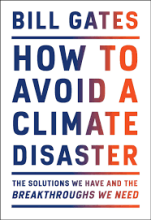This will be hard
12 important questions on This will be hard
What, according to Bill Gates, is the main reason that gossil fuels are available everywhere?
- Fossil fuels are inexpensive.
- For an example = oil is cheaper than a soft drink. A barrel of oil contains 42 gallons; the average price in the second half of 2020 was around $42 per barrel, so $1 per gallon, while costco sells soda for $2.85 per gallon.
What, according to Bill Gates, is the main reason that fossil fuels are so cheap?
- Fossil fuels are abundant and easy to move.
- And besides that, their prices don't reflect the damage they cause.
According to Bill Gates, the standards of living are going up in the world which is a problem when is comes to climate change, why is that?
- Almost everywhere, the standards of living are going up, which means the amount of energy used per person will go up, and so will the amount of greenhouse gases emitted per person.
- For an example, think of the rising demand for cars, computers etc. Even building the infrastructure we'll need to create all this energy, like wind turbines, will itself involve releasing more greenhouse gases.
- Higher grades + faster learning
- Never study anything twice
- 100% sure, 100% understanding
According to Bill Gates, there will be more people in the world which is a problem when is comes to climate change, why is that?
- The global population is headed toward 10 billion by the end of the century, and most of this growth will take place in cities that are highly carbon intensive. By the time it's 2060, the world's building stock will double.
According to Bill Gates, energy transitions take a long time, why is that?
- We have done similar transitions before, like exchange from the one energy source to another - but is has always taken decades to achieve this.
- For an example = natural gas that accounted 1% of the world's energy in 1900, but 70 years later it reach 20%.
What is the difference between the energy transition that we need now, if you compare it with previous energy changes?
- In history, we've moved from sources because one source was cheaper and more powerful. For example, we're using more natural gas and less coal to generate electricity, because this made it cheaper. So, it was a matter of economics reason, not the environment.
- So, we have to force an unnaturally transition, which is very complex in public policy and technology.
What is the reason that energy transitions take so long because of the size of the energy industry?
- The energy industry is one of the biggest businesses on the planet, and anything that big and complex will resist change.
- For an example = in the energy industry, you have huge capital costs that never go away. If you spend $1 billion building a coal plant, the next plant you build will not be any cheaper. Because your investors have the expectation that the plant will run for a long time, you're not just going to shut down your old plant if someone comes with a better technology down the road.
What is the reason that energy transitions take so long because of the fact that society tolerates little risk in energy business?
- Society demands reliable electricity.
- For example = Since the accidents at Three Mile Island and Chenobyl, America has broken ground on just two nuclear plants, while more people die from coal pollution than all nuclear accidents combined.
According to Bill Gates, building an energy system that's reliable and safe and isn't dependent on fossil fuels will not be easy because of "our laws and regulations are so outdated". Can you explain this?
- A lot of environmental laws and regulations weren't designed with climate change in mind.
- For an example = one of America's law related to air quality, Clean Air Act, barely mentions greenhouse gases at all.
- For an example = CAFE (Corporate Average Fuel Economy); adopted in 1970s because of fuel-efficiency cars, which is great, but now we need to more more electric vehicles on the road, and the CAFE standards haven't helped with that, because they weren't dedsigned with climate change in mind.
To what extent would emissions have decreased by the year 2030 as a result of federal and state policies, according to Bill Gates?
- It comes to about 300 millions tons, or about 5% of projected U.S. Emissions in 2030.
- According to Bill Gates, that's nothing to scoff at, but it's not going to be enough to get us near zero.
Can you explain the argument of the group that are not convinced about the problem of climate change and what is Bill Gates's answer to this group?
- Bill Gates is talking about some - politically powerful - groups, who are not persuaded by the science. Not everyone finds it necessarily that we should invest large amounts of money in the solution of climate change.
- For an example = some people argue that there are other problems with a major impact on humans, like health and education.
- Bill Gates's answer = If we don't stop adding greenhouse gases to the atmosphere, bad things will happen to people's life, for instance making the poorest people even poorer. It deserves the same priority as health and education.
Global cooperation is difficult when it comes to solving climate change, why is that?
- It's not easy to get all countries agree to something, when you're asking them to incur some new cost, like the expense of curbing its emissions.
- The Paris Agreement was an achievement, because it showed that global cooperation is possible.
The question on the page originate from the summary of the following study material:
- A unique study and practice tool
- Never study anything twice again
- Get the grades you hope for
- 100% sure, 100% understanding
































